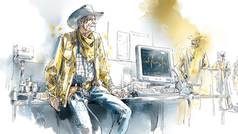top of page
Notre expertise
Pour des projets de santé qui ont vraiment de l'impact

Expertise en santé publique et Partenariat patients
Co-construire avec les personnes concernées : C’est ainsi que l’on crée des projets à impact ancrés dans les enjeux de santé publique.

Ingénieurie scientifique
et Design en santé
Décrypter les usages, cartographier les parcours : C’est ainsi que l’on conçoit des solutions de santé utiles, fluides et rigoureuse.

Sciences cognitives et Marketing social en santé
Identifier les biais, les freins, les déterminants sociaux de santé : C’est ainsi que l’on mobilise des leviers finement adaptés à chaque public.
Ils nous font confiance
 |  |  |
|---|---|---|
 |  |  |
 |
Les Lucky Stars
Experts en santé publique, problématiques patients et sciences comportementales
Nos actualités & analyses
bottom of page



















